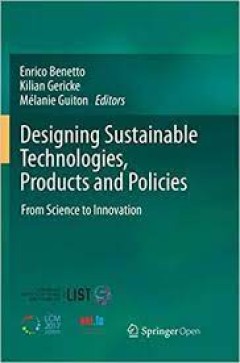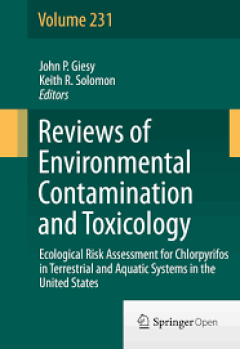Filter by

Designing Sustainable Technologies, Products and Policies : From Science to I…
This open access book provides insight into the implementation of Life Cycle approaches along the entire business value chain, supporting environmental, social and economic sustainability related to the development of industrial technologies, products, services and policies; and the development and management of smart agricultural systems, smart mobility systems, urban infrastructures and energ…
- Edition
- 1
- ISBN/ISSN
- 978-3-319-66981-6
- Collation
- XIV, 520
- Series Title
- -
- Call Number
- 628 DES

Renewing Local Planning to Face Climate Change in the Tropics
This book is open access under a CC BY 4.0 license. This book aims to inspire decision makers and practitioners to change their approach to climate planning in the tropics through the application of modern technologies for characterizing local climate and tracking vulnerability and risk, and using decision-making tools. Drawing on 16 case studies conducted mainly in the Caribbean, Central Am…
- Edition
- -
- ISBN/ISSN
- 978-3-319-59096-7
- Collation
- XVI, 372
- Series Title
- Green Energy and Technology (GREEN)
- Call Number
- 333 REN

Emerging Threats of Synthetic Biology and Biotechnology : Addressing Security…
Synthetic biology is a field of biotechnology that is rapidly growing in various applications, such as in medicine, environmental sustainability, and energy production. However these technologies also have unforeseen risks and applications to humans and the environment. This open access book presents discussions on risks and mitigation strategies for these technologies including biosecurity, …
- Edition
- -
- ISBN/ISSN
- 978-94-024-2086-9
- Collation
- XV, 225
- Series Title
- NATO Science for Peace and Security Series C: Environmental Security (NAPSC)
- Call Number
- 333 EME

The Barcelona School of Ecological Economics and Political Ecology : A Compan…
In this open access book, ecological economics and political ecology traditions converge into a single academic school. The book constitutes a common ground where multiple and critical voices are expressed, covering a broad scope of urgent matters at the crossroad between society, economy and the natural environment. The manuscripts composing this compendium offer appealing material for both ex…
- Edition
- -
- ISBN/ISSN
- 978-3-031-22566-6
- Collation
- XXV, 400
- Series Title
- Studies in Ecological Economics (SEEC, volume 8)
- Call Number
- 333 BAR

Habitats and Biota of the Gulf of Mexico: Before the Deepwater Horizon Oil Spill
This book is open access under a CC BY-NC 2.5 license. The Gulf of Mexico is an open and dynamic marine ecosystem rich in natural resources but heavily impacted by human activities, including agricultural, industrial, commercial and coastal development. The Gulf of Mexico has been continuously exposed to petroleum hydrocarbons for millions of years from natural oil and gas seeps on the sea f…
- Edition
- 1
- ISBN/ISSN
- 978-1-4939-3447-8
- Collation
- oer.unej.ac.id
- Series Title
- -
- Call Number
- 658

Advancing Energy Policy : Lessons on the integration of Social Sciences and H…
This open access book advocates for the Social Sciences and Humanities to be more involved in energy policymaking. It forms part of the European platform for energy-related Social Sciences and Humanities’ activities, and works on the premise that crossing disciplines is essential. All of its contributions are highly interdisciplinary, with each chapter grounded in at least three different Soc…
- Edition
- 1
- ISBN/ISSN
- 9783319990972
- Collation
- XXVII, 193 hlm; ill., lamp.,
- Series Title
- -
- Call Number
- -

Maritime Spatial Planning: past, present, future
This open access book is the first comprehensive overview of maritime or marine spatial planning. Countries across the globe are beginning to implement maritime spatial plans; however the authors of this collection have identified several key questions that are emerging from this growing body of MSP experience. How can maritime spatial planning deal with a complex and dynamic environment such a…
- Edition
- 1
- ISBN/ISSN
- 9783319986968
- Collation
- XXXVII, 477 hlm; ill., lamp.,
- Series Title
- -
- Call Number
- -

Megatrends in Agriculture, Food Industry and Food Markets : An Empirical and …
This book offers a research-based, holistic overview of the entire value chain of the global food industry. It captures and defines over 80 contemporary ‘megatrends’ in agriculture and the food market that can be empirically documented and have a major impact on business, economies, industries, societies, and individuals. Today the world is characterized by more uncertainty and unpredict…
- Edition
- 1
- ISBN/ISSN
- 9783031581526
- Collation
- XLV, 410 hlm; ill., lamp.,
- Series Title
- -
- Call Number
- -

Ecological Risk Assessment for Chlorpyrifos in Terrestrial and Aquatic System…
Introduction CONTENTS Preface Foreword by Keith Solomon and John Giesy Foreword by Coordinating Board of Editors Ecological Risk Assessment of the Uses of the Organophosphorus Insecticide Chlorpyrifos, in the United States John P. Giesy, Keith R. Solomon, G. Christopher Cutler, Jeffrey M. Giddings, Don Mackay, Dwayne Moore, John Purdy, W. Martin Williams Properties and Uses of Chlorpyrifos in t…
- Edition
- -
- ISBN/ISSN
- 9783319038650
- Collation
- XVI, 269
- Series Title
- -
- Call Number
- -

Goods and Services of Marine Bivalves
The aim of this open access book is to review and analyse the goods and services of bivalve shellfish. How they are defined, what determines the ecological functions that are the basis for the goods and services, what controversies in the use of goods and services exist, and what is needed for sustainable exploitation of bivalves from the perspective of the various stakeholders. The book is foc…
- Edition
- 1
- ISBN/ISSN
- 9783319967769
- Collation
- XXV, 591 hlm,: ill, lamp;
- Series Title
- -
- Call Number
- -
 Computer Science, Information & General Works
Computer Science, Information & General Works  Philosophy & Psychology
Philosophy & Psychology  Religion
Religion  Social Sciences
Social Sciences  Language
Language  Pure Science
Pure Science  Applied Sciences
Applied Sciences  Art & Recreation
Art & Recreation  Literature
Literature  History & Geography
History & Geography